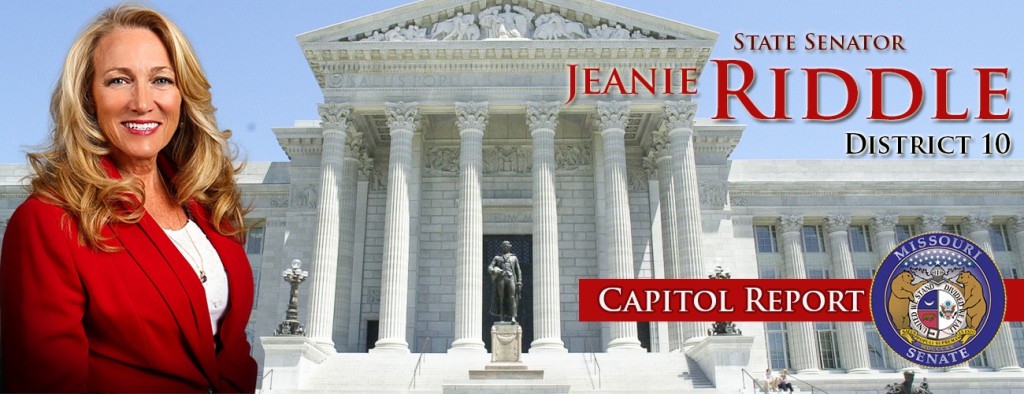Senate Passes 2017 Budget
This week, the Senate brought the state budget for fiscal year 2017 to the floor after a week and a half of hearings in the Senate Appropriations Committee. On Thursday, the Senate considered the $27.1 billion budget plan, including funding for Missouri’s education, transportation, and similar state-funded programs. Our budget and general revenue is first proposed by the governor and then evaluated and changed by the House; then, the Senate makes further amendments. After this step, the bills go to a conference committee of the House and the Senate to settle on a final budget. After the collaboration between the House and the Senate, and final approval by both bodies, the governor approves the final budget to be allocated next fiscal year, which begins in July.
Our goal in such a detailed budget process is to make the budget more transparent for the amounts departments will need for beneficial programs. In most departments, there have been cost increases in line with the Consumer Price Index (CPI), which is typically described as reasonable and sustainable. However, we are trying to find ways to be more efficient with costs and protect hardworking Missourians.
There are several changes in the budget this year that should be highlighted in our district, particularly in education spending. House Bill 2002, which deals with 2017 funding for the Department of Elementary and Secondary (DESE) Education, calls for a 2.1 percent increase, to almost $6 billion, in state funding, including a $71 million increase for Foundation Formula. This is a positive step forward for our state’s elementary and secondary education system, which will benefit students, teachers and families.
In addition to K-12 education funding, the Senate also considered funding for higher education institutions. The House proposed a 2 percent performance funding increase for all public universities in Missouri, aside from the University of Missouri System, which would receive a 0 percent increase. The Senate decided upon a 6 percent increase for performance and equity funding for all public Missouri universities, which was originally requested in the governor’s proposed budget. While many discussions on funding for the University of Missouri System centered on reducing funding, we could not punish our tuition-paying Missourians based on the poor choices of the administration. Instead, the Senate proposed a $1 million cut from the system’s administration budget to be held accountable for their actions last fall.
This means that most public colleges and universities may receive anywhere between 2 percent to 6 percent in the final budget, but this still must be discussed by the conference committee and approved by the governor. In addition, the Senate proposed an $18 million increase for all scholarship programs, including Bright Flight, Access Missouri, and the A+ Program. By supporting our public universities, our state is investing in those who choose to further their education here.
Other modifications included an effort to better control spending and slow the growth of government. This year, we saw an increase of 26 percent in social services, which have been continually growing year after year. The pharmacy line item alone for Medicaid spending has doubled in the last five years, from $900 million to $1.8 billion this year. While these growths are occurring every year in a runaway fashion, we were able to cut $40 million from other areas of this part of the budget.
The Senate also made some changes to House Bill 11 that will increase funding for comprehensive women’s health care. The Senate plans to distribute $10 million to federally qualified health clinics, rural health clinics, local public health clinics, and private providers which will provide women with greater access to more thorough health care, i.e. mammograms and prenatal care, from qualified doctors and nurses. Rural areas tend to have fewer doctors and health professionals in the area. By increasing funding to these facilities, we can ensure the safety and well-being of women living in rural areas by providing quality, comprehensive health care services.
Our Senate district has many state employees, and unfortunately they are last in the nation in average pay. A competitive wage is necessary to attract the most qualified Missourians to handle many of our government’s most important functions. This year we added a 2 percent pay raise for state employees in an effort to acknowledge their service to this state and give them a better means to provide for their families.
Though these decisions have been made by the Senate, there is still a long process before the budget is finalized. Percentages and dollar amounts need to be examined until exhausted in order to perform as efficiently as possible in our state government and departments. During this process, we will remain focused on how to best improve the lives of Missourians in our communities and protect every day, hardworking families from unnecessary spending.
It is an honor to be your State Senator and my door is always open to your concerns, questions or comments. Please feel free to contact me at (573) 751-2757 or visit my web page at www.senate.mo.gov/riddle.

